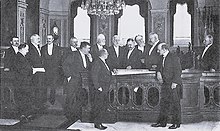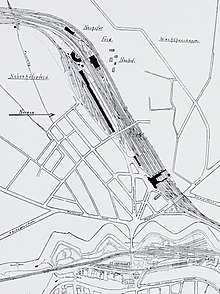Johann Heinrich Evers
Johann Heinrich Evers (born December 30, 1855 in Lübeck ; † July 22, 1926 there ) was a Lübeck businessman and senator.
Life
origin
Heinrich Evers was born as the son of a family that had lived in Lübeck for over 300 years. His father was a respected member of the then " Gewandschneider -Compagnie". His father and grandfather, he founded his grandson's drapery shop JH Evers in 1817 .
The senior Johannes Evers was his younger brother.
career
In 1881, when Heinrich Evers was abroad to expand his knowledge, his father died unexpectedly. With him, the third generation was appointed to head the cloth trade on the corner of Wahmstrasse and Breite Strasse .
After the 26-year-old returned to his hometown, he was active in public life, including at the head of the Lübeck gymnastics association.
Evers was elected to the Lübeck citizenship in 1889 and achieved an influential position here thanks to his great objectivity and extensive knowledge. He was repeatedly appointed to the Citizens Committee and the Presidium of the Citizenship . In 1893 he became a member of the board of the Lübeck merchants' association . In addition to the Chamber of Commerce, he also worked in other commercial and welfare organizations. He did this particularly successfully in the church councils of St. Petri and the cathedral .
On April 29, 1896 spoke Evers at the meeting of the Father Municipal Association to the once by Walther Brecht , director of the Lübeck-Büchen Railway Company , initiated Bahnhof question . Only two of the planned projects were considered:
- the so-called Rethteichjrojekt however, should not head station near the Linde place , but a way station near the Protect court received
- an elevation of the railway on the Wall Peninsula, whereby the passenger station would come after the cat bastion , while the freight station would remain in its current location
In 1903 Evers elected the citizenship as their spokesman before he was elected to the Lübeck Senate on April 3, 1903 . As one of the busiest members of the Senate, he had served in the highest state body for 23 years. The main area of his activity lay with the tax authorities, the poor and the foundation authorities, as well as with the building authorities. In addition, he was a leader in financial matters of the church council , the civil servants' commission of the senate, the senate commission for trade and shipping, the authority for Travemünde , the accounting authority and other numerous bodies of public life.
Since 1925 he was afflicted by illnesses and forced to restrict his public activities. The city saw the resignation of one of its best senate members, "especially during the time of the collapse of the national community", on June 1, 1926 with great regret.
literature
- Senator Heinrich Evers retired. In: Father-city sheets. Year 1925/26, No. 21, edition of July 4, 1926.
- Emil Ferdinand Fehling : Lübeckische Ratslinie , Lübeck 1925, No. 1028
- Karl-Ernst Sinner: Tradition and Progress. Senate and Mayor of the Hanseatic City of Lübeck 1918-2007 , Volume 46 of Series B of the publications on the history of the Hanseatic City of Lübeck published by the Archives of the Hanseatic City of Lübeck , Lübeck 2008, p. 77
Web links
Individual evidence
- ↑ Father City Association. In: Lübeckische Blätter ; Volume 38, number 30, edition of May 3, 1896, p. 207.
| personal data | |
|---|---|
| SURNAME | Evers, Johann Heinrich |
| ALTERNATIVE NAMES | Evers, Heinrich (full name) |
| BRIEF DESCRIPTION | Lübeck businessman and senator |
| DATE OF BIRTH | December 30, 1855 |
| PLACE OF BIRTH | Lübeck |
| DATE OF DEATH | July 22, 1926 |
| Place of death | Lübeck |



